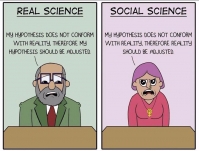Enjoy being online again!
Welcome to the community of good people who base their values on evidence and appreciate civil discourse - the social network you will enjoy.Create your free account
8 comments
Feel free to reply to any comment by clicking the "Reply" button.I know it's a cartoon,(one dissing sociology) but I doubt very seriously that Max Weber, Emile Durkheim, Georg Simmel, Karl Marx, and others adjusted their reality to fit their hypotheses. I can't see Durkheim taking statistics about suicide and changing those facts because maybe he didn't like the idea that men commit suicide more often than women. It is just as difficult to study a group as an individual. Maybe one-day psychology and sociology will be melded together to get a more accurate picture of the individual in relation to the society he/she is part of. An analogy: Genes react to their environment because genes are an expression of their environment. So we must study genes and the environment to understand how both interact with each other.
FYI: "Although sociology has its roots in the works of philosophers like Plato, Aristotle, and Confucius, it is a relatively new academic discipline. It emerged in the early nineteenth century in response to the challenges of modernity. Increasing mobility and technological advances resulted in the increasing exposure of people to cultures and societies different from their own. The impact of this exposure was varied, but for some people it included the breakdown of traditional norms and customs and warranted a revised understanding of how the world works." (History of Sociology)
Let's use this forum to keep learning, too.
Totally concur. Real social science IS scientific.
Seems to me to be more of a statement about the failings of the study of social science than a statement about today's society. It also seems to be somewhat misogynistic.
Nothing is sexier than a male feminist . . .
I can agree that the worldview on the right appears in our present society. I do take exception to the idea that this is what social science does, though. Social science is complicated, because people are complicated. Psychology and sociology will never be able to make the same kind of conclusions that physics and biology do, because so many factors contribute to human behavior. That doesn’t mean we should stop examining them. Like hard sciences, social science continues to search for better explanations. That is different from the value of, say, evangelicals, who simply disregard any evidence that conflicts with what they already believe.
I agree, people today seem to be so set in their opinions that they won't give in to actual hard facts no matter how obviously they are presented to them.
Many years ago, I did a summer semester at the Weizman Institute. One day we were all sitting around drinking our 3% beer and we decided to rank the sciences. What we came up with was something like this: Math, Physics, Chemistry, Stamp Collecting, Phrenology, Tasseomancy, and after a long stretch we came to sociology. Last on the list was Economics and we decided to keep it off the list as not being related to science in any observable way.
Varn:
“Tasseomancy” -- had to look than one up, got it - perfect, still grinning
Enjoy being online again!
Welcome to the community of good people who base their values on evidence and appreciate civil discourse - the social network you will enjoy.Create your free account
Share this post
Categories
Agnostic does not evaluate or guarantee the accuracy of any content. Read full disclaimer.









